Second round debate takeaways: Should 2020 democrats go big or get real?
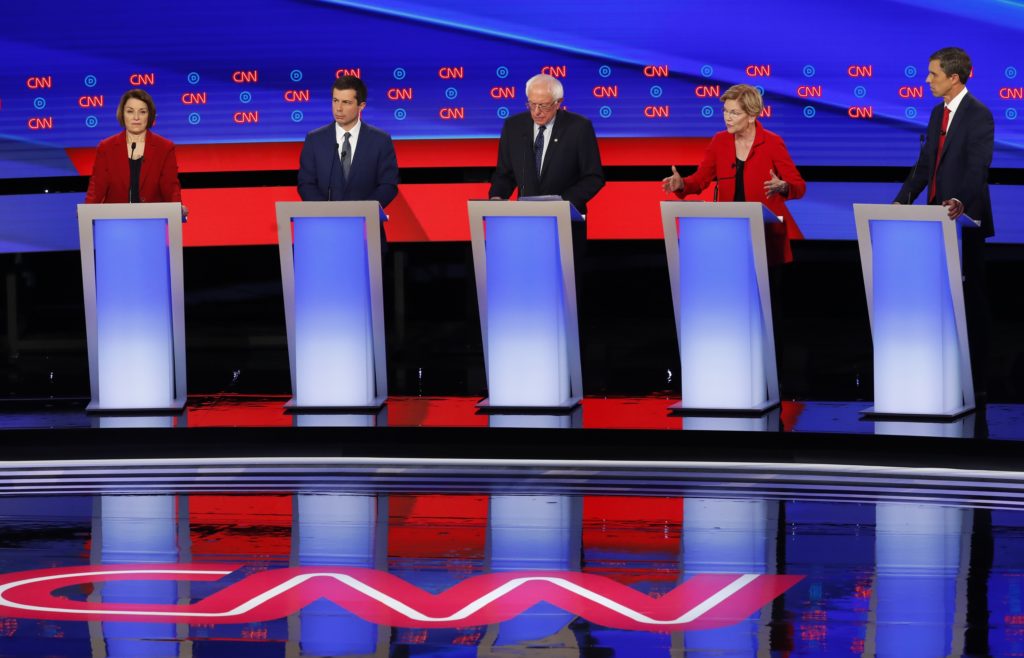
Should Democrats be going big or getting real? That’s the question that dominated the Democratic presidential primary debate as progressive favorites Elizabeth Warren and Bernie Sanders fended off attacks from lesser-known moderates. The display amounted to a sometimes testy public airing of the party’s anxieties about how far left is too left and how to beat President Donald Trump. Here are the key takeaways from the debate: EVOLUTION VS. REVOLUTION The battle lines were clear at Tuesday’s debate from the opening remarks. This was the pragmatists against the front-runners seeking transformational change. Over and over, moderate candidates like Montana Gov. Steve Bullock, former Colorado Gov. John Hickenlooper and former Rep. John Delaney argued Massachusetts Sen. Elizabeth Warren and Vermont Sen. Bernie Sanders’ plans — from “Medicare for All” to the Green New Deal — are unrealistic and would scare off voters. Bullock bemoaned the candidates’ “wish-list economics.” Minnesota Sen. Amy Klobuchar dismissed free college even for wealthy families as unworkable and touted her ideas “grounded in reality.” Hickenlooper called for “an evolution, not a revolution,” on health care. The attacks weren’t shocking in a debate that featured the progressive standouts Warren and Sanders onstage with a handful of lesser-known moderates looking to seize the spotlight. But the two senators’ unified front in fighting them off was notable. Though they are jockeying for some of the same voters, Warren and Sanders didn’t bother going after each other. They largely beat back the moderate critique of their call for sweeping, systemic change with similar arguments. Sanders argued his health plan is “not radical” and achievable. Warren said the country’s problems can’t be solved with “small ideas and spinelessness.” PLAYING INTO TRUMP’S HANDS? Donald Trump loomed large over the Democratic debate stage. Repeatedly, the candidates mixed their policy plans with political strategy, arguing over whether their party’s leftward push will only open them up to GOP criticism. On topics from Medicare for All to immigration, Warren and Sanders found themselves under attack as their more moderate competitors told them their policies only played into Trump’s hands. The notion of taking away private insurance from millions and a Green New Deal that “makes sure that every American’s guaranteed a government job that they want” is “a disaster at the ballot box,” Hickenlooper said. “You might as well FedEx the election to Donald Trump,” Hickenlooper said. Delaney wondered, “Why do we have to be so extreme?” Even self-help author Marianne Williamson chimed in to say she does “have concern about what the Republicans would say.” South Bend, Indiana, Mayor Pete Buttigieg tried to end the unusually public display of anxiety, declaring that “it is time to stop worrying about what the Republicans will say.” “If it’s true that if we embrace a far left agenda they’re going to say we’re a bunch of crazy socialists,” Buttigieg said. “If we embrace a conservative agenda, you know what they’re going to do? They’re going to say we’re a bunch of crazy socialists. So let’s just stand up for the right policy, go out there, and defend it.” MEDICARE FOR ALL TAKES HEAT If the fight was between centrists and progressives, Medicare for All was the weapon. The early moments of the debate were dominated by a fight over whether Sanders’ plan to eliminate private insurance in favor of a universal government health plan is possible, practical or political suicide. At times, with Medicare for All supporters Sanders and Warren outnumbered, the centrists piled on, raising doubts about the quality of care it could offer, the costs and the disruption to the health care system. Ohio Rep. Tim Ryan called it “bad policy and bad politics.” Bullock said he couldn’t support a plan that “rips away” insurance from Americans who have it. “It used to be Republicans who wanted to do repeal and replace,” Bullock said, referring to the Republican refrain on getting rid of President Barack Obama’s Affordable Care Act. Sanders, who has spent much of his career on the issue, grew agitated as he defended the plan. The coverage would actually be better, he argued. “You don’t know that, Bernie,” Ryan interjected. “I do know,” Sanders fired back. “I wrote the damn bill!” UNITED AGAINST TRUMP ON RACE For all the divisions onstage Tuesday, the candidates were unified in rebuking Trump’s racist comments and using race as a campaign theme for 2020. Trump in recent weeks has told four congresswomen of color to “go back” to the countries they came from even though they’re all U.S. citizens and has criticized Rep. Elijah Cummings’ Baltimore-area district as a “rat and rodent infested mess.” “I have had it with the racist attacks,” Klobuchar said in her opening statement.Sanders said Trump exploited racism. Warren said, “The president is advancing environmental racism, economic racism, criminal justice racism, health care racism.” Warren won strong applause from the Detroit audience when she declared her administration would treat white supremacy as a form of domestic terrorism. Buttigieg also directed criticism at members of Congress he said are supportive of or silent on “naked racism” in the White House. “If you are a Republican member of Congress, consider the fact that when the sun sets on your career, and they are writing your story of all the good and bad things you did in your life, the thing you will be remembered for is whether in this moment, with this president, you found the courage to stand up to him or you continued to put party over country,” he said. It was one of the loudest applause lines of the night. The Alabama Today post on the first democratic debate can be found here. By Sara Burnett and Brian Slodysko Associated Press Associated Press writer Hunter Woodall contributed from Detroit. Republished with permission of the Associated Press.
2020 hopeful Elizabeth Warren pitches new private equity constraints
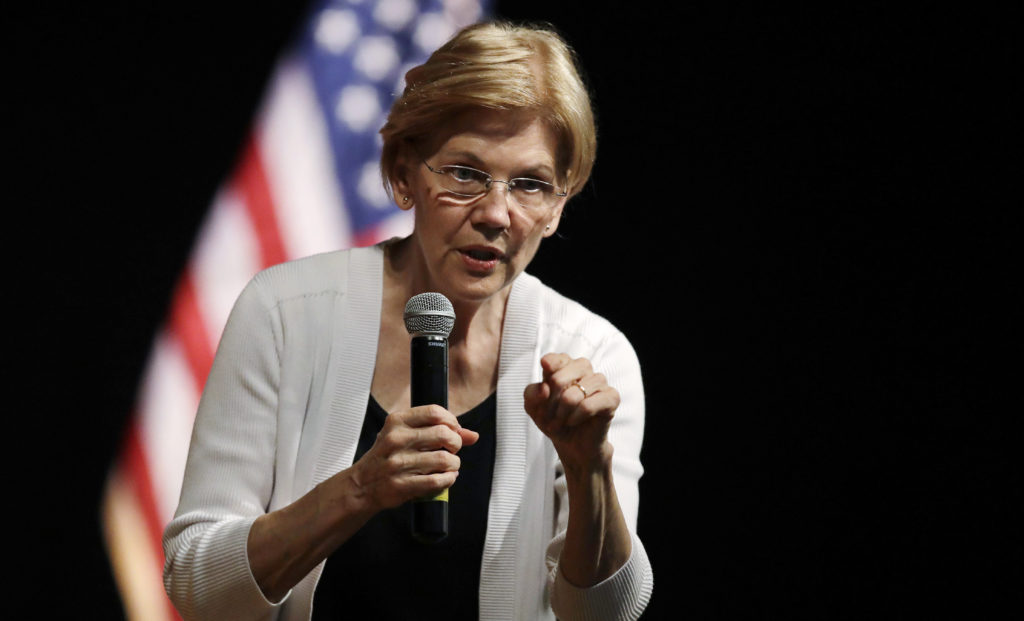
White House hopeful Elizabeth Warren is proposing new regulations on the private equity industry, pitching constraints designed to end what she decries as “legalized looting” by investment firms that take over troubled companies. Warren’s plan, the latest in a series of policy ideas that have propelled the Massachusetts senator to the top tier of the 2020 Democratic presidential primary, would hold private equity firms liable for debts and pension promises made by the companies they buy up. It would restrict the firms’ ability to pay dividends as well as high fees that shift money out of acquired companies. The new private equity rules bring Warren’s detail-driven campaign back to the familiar ground that launched her political career — reining in Wall Street. Warren, the former chair of the independent panel that oversaw the government’s 2008 bailout of major financial institutions, is a longtime foe of the financial industry who has underscored since launching her presidential run that she is a capitalist. But like democratic socialist Bernie Sanders , a rival for the Democratic nomination to challenge President Donald Trump, Warren is building her campaign around a promise of sweeping upheaval she says would spread around more of the benefits of economic growth. “I am tired of big financial firms looting the economy to pad their own pockets while the rest of the economy suffers,” Warren wrote in a Medium post announcing her plan on Thursday. “I am done with Washington ignoring the evidence and acting as though boosting Wall Street helps our families. Financial firms have helped push our economy badly off track.” Warren’s private equity proposals also include new rules that would require worker pay to take precedence over other obligations when companies declare bankruptcy as well as more open disclosure of investment firms’ fees, both of which are included in private legislation she’s set to introduce later Thursday alongside Senate and House Democratic colleagues. Her platform further calls for the restoration of dividing lines between commercial and investment banking that were repealed in 1999, a change that was part of both the Republican and the Democratic platforms during the 2016 presidential election despite Trump’s lack of emphasis on it during his campaign. Warren is headed to Iowa for a two-day campaign swing during which she’s likely to tout her new private equity plan, the latest installment of a broader self-described “economic patriotism” agenda that also includes a $2 trillion investment in environmentally friendly manufacturing . Besides bolstering her credentials as an antagonist of Wall Street, Warren’s new proposal also gives her the chance to tout her avoidance of high-dollar fundraisers and reliance on small donors to power her campaign. Sanders, a Vermont senator, has similarly vowed to forgo high-dollar fundraisers, but the private equity industry remains a notable supporter of several of their Democratic presidential rivals . Federal Election Commission records show that employees of Blackstone, which leads Private Equity International’s ranking of top private equity firms, have donated a total of $102,100 to 11 Democratic presidential hopefuls this year, with South Bend, Indiana, Mayor Pete Buttigieg topping the list of recipients at $30,800. Neither Warren nor Sanders reported receiving contributions from the private equity giant’s employees. By Elana Schor Associated Press Associated Press writer Brian Slodysko contributed to this report. Republished with permission of the Associated Press.
Joe Biden campaigns as Obamacare’s top defender
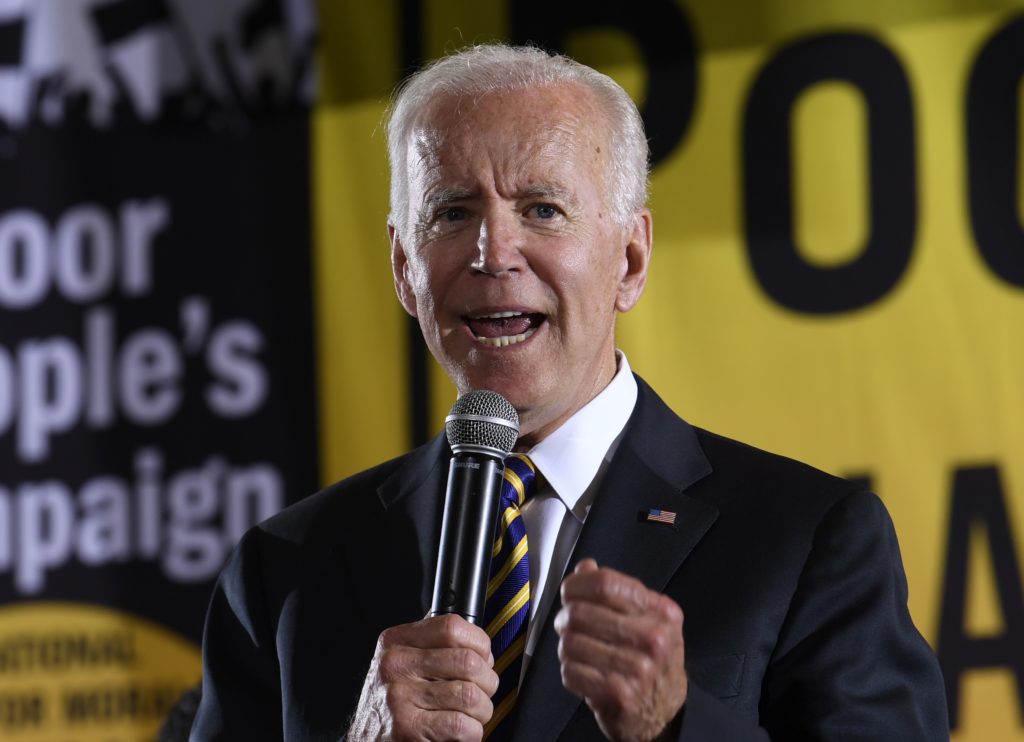
Joe Biden is taking an aggressive approach to defending Obamacare, challenging not just President Donald Trump but also some of his rivals for the Democratic presidential nomination who want to replace the current insurance system with a fully government-run model. The former vice president will spend much of the coming week talking about his approach to health care, including remarks he’ll deliver on Monday in Iowa at a presidential forum sponsored by AARP. His almost singular focus on the 2010 health care law has been on display recently in the early voting states. In Iowa, he declared himself “against any Republican (and) any Democrat who wants to scrap” Obamacare. Later in New Hampshire, he said “we should not be scrapping Obamacare, we should be building on it,” a reference to his approach to add a government insurance plan known as the public option to existing exchanges that sell private insurance. Biden is hoping his positioning as Obamacare’s chief defender could be helpful on several fronts. It’s a reminder of his close work alongside President Barack Obama, who remains popular among Democratic voters. And it could reinforce his pitch as a sensible centrist promising to rise above the strident cacophony of Trump and Democrats including Sens. Bernie Sanders, Elizabeth Warren and Kamala Harris, all single-payer advocates. Perhaps as important, it’s an opportunity for Biden to go on offense ahead of the next presidential debate at the end of July. Biden has spent the past several weeks on defense, reversing his position on taxpayer funding for abortions and highlighting his past work with segregationist senators. Harris slammed him during the first debate, blasting the segregationist comment and criticizing his opposition to federal busing orders to desegregate public schools during the same era. Each of the episodes raised questions about whether Biden can maintain his front-runner status. In New Hampshire over the weekend, it was clear Biden wanted to turn the tables as he touted the idea of a “Medicare-like” plan that any American could buy as opposed to a “Medicare-for-all” that would be imposed on everyone. “I think one of the most significant things we’ve done in our administration is pass the Affordable Care Act,” Biden said. “I don’t know why we’d get rid of what in fact was working and move to something totally new. And so, there are differences.”He argued that some of his opponents, with the exception of Sanders, aren’t fairly representing the consequences of their proposals. “Bernie’s been very honest about it,” Biden said. “He said you’re going to have to raise taxes on the middle class. He said it’s going to end all private insurance. I mean, he’s been straightforward about it. And he’s making his case.” Asked specifically whether Harris has been honest about how her plan would affect private insurance, Biden said, “I’ll let you guys make that judgment.” During last month’s debates, Harris, Warren and Sanders raised their hands when candidates were asked as a group whether they supported eliminating private insurance. A day later, Harris, a Senate co-sponsor of Sanders’ single-payer bill, reversed her answer — the second time since her campaign launch that she’d walked back her seeming endorsement of eliminating private insurance. She explained that she interpreted the debate moderator’s question as asking whether she’d be willing to give up her existing coverage as part of a single-payer model. She said she wants private policies to remain “supplemental” options for consumers. Sanders, meanwhile, hit back at Biden, clarifying that his plan would be a net financial benefit for most households: Their federal taxes would go up, but their private insurance premiums, deductibles and co-pays would be eliminated. “At a time when Donald Trump and the health insurance industry are lying every day about ‘Medicare for All,’ I would hope that my fellow Democrats would not resort to misinformation about my legislation,” Sanders said in a statement responding to Biden’s New Hampshire comments. Biden hasn’t yet introduced his full health care plan, but has said it will be anchored by a “Medicare-like” plan that would be available to anyone — including the 150 million-plus Americans now covered by job-based insurance, a group now ineligible for exchange-based policies. Biden has indicated that income-based subsidies would ensure that any household could get coverage. The idea is to expand coverage immediately and shake up insurance markets long-term by forcing private insurers to compete alongside the government, theoretically pressuring to lower their premiums and out-of-pocket costs for private policy holders. Biden isn’t the only public-option advocate running for president. Former Colorado Gov. John Hickenlooper warns that Republicans will brand single-payer as “socialism,” hurting Democrats in the general election. Colorado Sen. Michael Bennet echoes Biden’s argument with a call to “finish the work we started with Obamacare.”Minnesota Sen. Amy Klobuchar touts a public option as the next logical move even for single-payer advocates. “I think it is a beginning and the way you start and the way you move to universal health care,” she said in the first debate. If anything, the dynamics illustrate Democrats’ overall leftward shift on health care.A decade ago, as Obama pushed for ACA, the public option was effectively the left-flank for Democrats, a reality made obvious when Obama angered House liberals by jettisoning the provision to mollify some moderate Senate Democrats needed to pass the legislation. Now, after Sanders’ insurgent 2016 presidential bid and his promise of “health care as a human right,” the left has embraced single-payer, with moderates moving to the public option.Yet with the exception of Biden, the moderates are languishing far back in polls, leaving the former vice president to capitalize on the dividing lines and promising that he would do what Obama couldn’t. “And,” he declared, “it can be done quickly.” By Bill Barrow Associated Press Associated Press writers Hunter Woodall and Julie Pace contributed from Portsmouth, New Hampshire. Follow Barrow on Twitter at https://twitter.com/BillBarrowAP. Republished with the permission of the Associated Press.
The Latest: Candidates work media in post-debate spin room
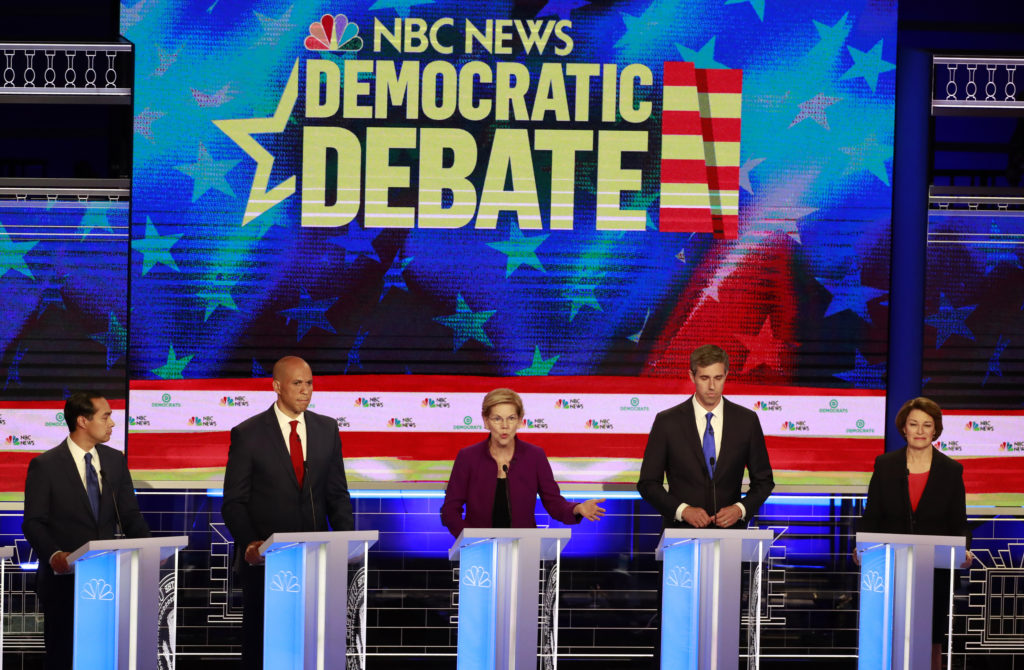
The latest on the first Democratic presidential debate (all times local): 12:15 a.m. The scene following Wednesday night’s debate was chaotic as the candidates dispersed into the spin room to try to frame the conversation following the main event. New York Mayor Bill de Blasio, former Housing Secretary Julian Castro, Ohio Rep. Tim Ryan, New Jersey Sen. Cory Booker, former Rep. John Delaney and Minnesota Sen. Amy Klobuchar all appeared in person among the crowds of reporters gathered. Castro, de Blasio and Booker, who each had standout moments during the debate, were mobbed by dozens of cameras and print reporters as they entered the room. Castro and de Blasio took victory laps, each telling reporters he was happy with how he drove the conversation. Other campaigns, including a handful representing candidates not debating till Thursday, sent surrogates and advisers to drive talking points to the media. 12:05 a.m. Bill de Blasio is making no apologies for his aggressive style during the first Democratic debate. The New York mayor says Democrats shouldn’t “be afraid to mix it up” and argues it’s a “giant turnoff to the voters” when politicians mince their words. De Blasio notably went after former Texas Rep. Beto O’Rourke for his opposition to eliminating private insurance in favor of nationalized health care. De Blasio faces an uphill battle to secure the nomination.But after the debate he chalked up his pugilism to frustration with his rivals. He says many of them said things that didn’t “fit the values of the party” and he is vowing to “call ’em out.” 11:10 p.m. The Democratic presidential candidates have concluded the first 2020 debate emphasizing the promise of America. The 10 candidates ended the night Wednesday by boiling down their stump speeches into answers that included why they were best positioned to beat President Donald Trump and how the primary is a battle for the soul of the Democratic Party. Fighting poverty, combating climate change and the proper role of government were prominent features of the concluding comments of the first debate of the 2020 cycle. Thursday will be the second night of debates. It, too, will feature 10 candidates, including front-runners former Vice President Joe Biden and Vermont Sen. Bernie Sanders. California Sen. Kamala Harris and South Bend, Indiana, Mayor Pete Buttigieg will also appear. 11 p.m. The 2020 Democratic presidential hopefuls have given a range of answers about what they see as the greatest threat facing the U.S., including China, climate change and President Donald Trump. The most common answer at Wednesday’s debate was China, mentioned by Sen. Amy Klobuchar, ex-Housing and Urban Development Secretary Julián Castro, Ohio Rep. Tim Ryan and former Maryland Rep. John Delaney. New York City Mayor Bill de Blasio (dih BLAH’-zee-oh) said Russia because the country “is trying to undermine our democracy.” Massachusetts Sen. Elizabeth Warren, New Jersey Sen. Cory Booker and former Texas Rep. Beto O’Rourke said climate change. Washington Gov. Jay Inslee, who’s made climate change the emphasis of his campaign, pointed instead to Trump. Rep. Tulsi Gabbard of Hawaii said nuclear war, which also got a mention from Delaney. Klobuchar also said Iran. 10:45 p.m. The urgency with which to address changes in the world’s climate has emerged as somewhat of a unifying topic at the first Democratic presidential debate. Washington Gov. Jay Inslee called his state’s progress on the issue the “gold standard.” He said Wednesday that he’s the only member of the massive Democratic field to make tackling the problem his top priority. Asked how he’d win over voters worried about possible government overreach in climate-related restrictions, former Texas congressman Beto O’Rourke pledged to help communities including the debate host city Miami, an area “on the front lines of climate change today.” Former Obama-era Cabinet secretary Julián Castro vowed a recommitment to the Paris Climate Accord, while former Maryland Rep. John Delaney noted he was alone in introducing a bipartisan carbon tax bill in Congress. 10:35 p.m. Elizabeth Warren’s campaign trail refrain is that she has “a plan for it.” That apparently extends to Senate Republican leader Mitch McConnell, who refused to hold a hearing for President Barack Obama’s last Supreme Court nominee. Warren was asked during Wednesday’s Democratic presidential debate if she has a plan for dealing with the Kentucky Republican, who prides himself in blocking Democrats’ legislative priorities. She answered, “I do,” drawing cheers from the audience. The Massachusetts senator says energized Democrats have to “stay on the front lines,” even after the 2020 presidential election is decided. She says pressure must be applied both from activists on the outside and leaders on the inside “to make sure this Congress reflects the will of the people.” 10:20 p.m. The Democratic presidential candidates are talking in very personal terms about gun violence and how to curb it.Sen. Cory Booker of New Jersey said at Wednesday’s debate that he lives in a neighborhood where shootings are common. He supports gun licensing and says, “This is not about policy. This is personal.” Sen. Elizabeth Warren of Massachusetts says the toughest questions she’s gotten on the campaign trail are from kids who ask how she’d keep them safe. Warren says the U.S. should “double-down” on research into what works to reduce gun violence. New York City Mayor Bill de Blasio (dih BLAH’-zee-oh) talked about raising a black son and trying to keep him safe, including from police.Wednesday’s debate is taking place in Miami, about 50 miles (80 kilometers) from the high school in Parkland, Florida, where a gunman killed 17 people last year. 10:10 p.m. The second hour of the first Democratic presidential debate has been derailed by technical difficulties. As debate moderators Rachel Maddow and Chuck Todd took over Wednesday for the next round of the debate, the 10 candidates on stage were unable to hear the question Todd was trying to ask about the federal government’s role in getting guns off the street. Following back-and-forth confusion, Todd announced the debate would head to a commercial break. It wasn’t immediately
Joe Biden draws ire from opponents in recalling ‘civility’ with segregationists

Joe Biden is under fire from rival Democratic presidential hopefuls for saying the Senate “got things done” with “civility” even when the body included segregationists. Speaking at a New York fundraiser Tuesday evening, he pointed to long-dead segregationist senators James Eastland of Mississippi and Herman Talmadge of Georgia to argue that Washington functioned more smoothly a generation ago than under today’s “broken” hyperpartisanship. “We didn’t agree on much of anything,” Biden said of the two men, who were prominent senators when Biden was elected in 1972. Biden described Talmadge as “one of the meanest guys I ever knew” and said Eastland called him “son,” though not “boy,” a reference to the racist way many whites addressed black men at the time. Yet even in that Senate, Biden said, “At least there was some civility. We got things done.” The comments quickly sparked one of the most intense disputes of the Democratic presidential primary, underscoring the risk to Biden as he tries to turn his decades of Washington experience into an advantage. Instead, he’s infuriating Democrats who say he’s out of step with the diverse party of the 21st century. Sen. Cory Booker, one of two major black candidates seeking the Democratic nomination, said Biden’s “relationships with proud segregationists are not the model for how we make America a safer and more inclusive place for black people and for everyone,” and he called for the Biden to apologize. “I have to tell Vice President Biden, as someone I respect, that he is wrong for using his relationships with Eastland and Talmadge as examples of how to bring our country together,” the New Jersey Democrat said in a statement that was especially notable coming from a candidate who entered the 2020 primary with a sunny message, vowing to highlight “the best of who we are and not the worst.” New York City Mayor Bill de Blasio, a fellow Democratic presidential candidate and a white man who is married to a black woman, also offered a sharp retort. “It’s 2019 & @JoeBiden is longing for the good old days of ‘civility’ typified by James Eastland,” de Blasio tweeted Wednesday, along with a picture of his family. “Eastland thought my multiracial family should be illegal.” The mayor added that “it’s past time for apologies or evolution” from Biden, whom de Blasio cast as “out of step with the values of the modern Democratic Party.” Cedric Richmond, Biden’s campaign co-chairman and former chairman of the Congressional Black Caucus, pushed back, saying Biden’s opponents are deliberately ignoring the full context of his argument for a more functional government. “Maybe there’s a better way to say it, but we have to work with people, and that’s a fact,” Richmond said, noting he recently dealt with President Donald Trump to pass a long-sought criminal justice overhaul. “I question his racial sensitivity, a whole bunch of things about his character … but we worked together.” Likewise, Richmond said, Biden highlighted Jim Crow-era senators to emphasize the depths of disagreements elected officials sometimes navigate. “If he gets elected president, we don’t have 60 votes in the Senate” to overcome filibusters, Richmond noted. “He could be less genuine and say, ‘We’re just going to do all these things.’ But we already have a president like that. (Biden) knows we have to build consensus.” Bakari Sellers, a prominent black South Carolina Democrat who backs California Sen. Kamala Harris for president, countered that Biden’s remarks are nonetheless part of a pattern that calls into question the notion that he’s the most electable Democrat. “It’s death by a thousand cuts,” Sellers said, noting that Biden’s status as a 76-year-old white man from the political establishment may help him with some white voters who backed Trump but could cost him with black voters, women and younger voters necessary for any Democrat to win the White House. “You aren’t going to build the winning coalition like this,” Sellers said. “The argument should be, ‘Joe Biden is the most electable if he will get out of his own way.’” The flare-up came on Juneteenth, the commemoration of the end of slavery in the United States, and on the same day that a congressional panel held an initial hearing on the idea of reparations to compensate Americans who suffer from the legacy of slavery and racism. For his part, Biden has shown some self-awareness of the political peril of talking about the upside of working with those who hold opposing views. He sometimes notes he will “get in trouble” before making his standard pitch that the “other side” is “the opposition” but not “the enemy.” His riffs are sometimes as innocuous as calling Bob Dole, the 95-year-old former Senate majority leader and 1996 Republican presidential nominee, a “decent guy” or paying homage to “my friend John McCain,” the former Arizona senator and 2008 GOP presidential nominee who died in 2018.But other times he ventures into more controversial territory. In the months before he announced his bid, Biden clarified remarks in which he called Vice President Mike Pence a “decent guy” after activists noted the Republican vice president’s opposition to LGBTQ civil rights protections. Biden said he offered his remarks in a “foreign policy context” and added, “There is nothing decent about being anti-LGBTQ civil rights.”Some Democrats hammered Biden for arguing that Republicans on Capitol Hill will have an “epiphany” and start working with Democrats again once Trump has left office, noting the GOP congressional blockade of President Barack Obama, whom Biden served for eight years as vice president.Biden has written and spoken for years of his relationships across a spectrum of politicians. Earlier this year, he eulogized former Sen. Fritz Hollings of South Carolina, who was once a segregationist state legislator and governor. In 2003, Biden gave the same honor to Republican Strom Thurmond, another former South Carolina politician who was among the first “Southern Democrats” to leave the party over its civil rights stances. At a May fundraiser in New Hampshire, Biden recalled as a young
Majority worry about 2020 meddling
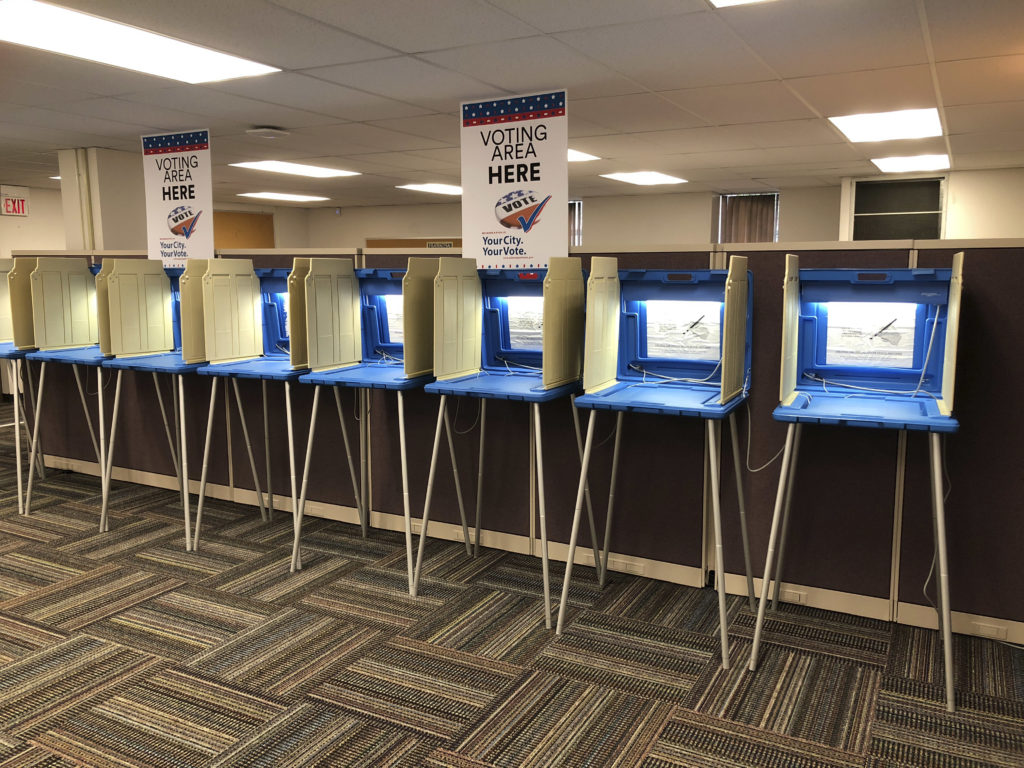
A majority of Americans are concerned that a foreign government might interfere in some way in the 2020 presidential election, whether by tampering with election results, stealing information or by influencing candidates or voter opinion, a new poll shows. The poll from The Associated Press-NORC Center for Public Affairs Research finds Democrats far more likely to express the highest level of concern, but Democrats and Republicans alike have at least some concerns about interference. Overall, half of Americans say they’re extremely or very concerned about foreign interference in the form of altered election results or voting systems, even though hackers bent on causing widespread havoc at polling places face challenges in doing so. An additional quarter is somewhat concerned. Similarly, about half are very concerned by the prospect of foreign governments influencing political candidates or affecting voters’ perceptions of the candidates, along with hacking candidate computer systems to steal information. In total, the poll, conducted Thursday through Monday, shows 63 percent of Americans have major concerns about at least one of those types of foreign election interference, including 80 percent of Democrats and 46 percent of Republicans. The results make clear that despite the efforts of U.S. officials to ward off election interference and to urge public awareness and calm, Americans remain anxious that some of the same tactics Russia used to meddle in the 2016 presidential election could surface again in the next race. Those include the spread of disinformation online to sow divisions among American voters, and the hacking by military intelligence officers of Democratic emails that were then published by WikiLeaks in the run-up to the election. The efforts were aimed at helping Republican Donald Trump over Democratic rival Hillary Clinton, according to special counsel Robert Mueller’s report. “I think that it’s been pretty well-documented that people have been influenced in the past by social media,” said Luci Dvorak, 32, an Illinois teacher. She said she found it concerning that Trump has been “very casual” about getting foreign help and even seemed to invite it. Trump said in a television interview last week that he would be open to receiving a foreign government’s help in the next election. He slightly walked back those comments in a follow-up interview, saying that though he would want to look at foreign dirt on an opponent to assess if it was correct, he would “of course” also report it to the FBI or the attorney general. U.S. officials are on high alert to protect against interference like what occurred in 2016. FBI Director Chris Wray has said the bureau regards last November’s midterm elections as a “dress rehearsal for the big show in 2020.” He has said efforts to undermine democracy and influence public opinion through social media, propaganda and false personas have continued unabated and are “not just an election-cycle threat.” “We saw that, therefore, continue full speed in 2018, in the midterms,” Wray said in April at a Council on Foreign Relations event. “What we did not see in 2018 was any material impact or interference with election infrastructure or, you know, campaign infrastructure.” The decentralized nature of the country’s elections, which are run on a local level and rely on different and varied voting systems, would make it hard for hackers to cause widespread problems. But concerns remain: Russian hackers gained access to voter databases in two Florida counties ahead of the 2016 election. Federal officials are also conducting a forensic analysis of electronic poll books to see if Russian military hackers who targeted a software provider may have tampered with registration information to disrupt voting in a North Carolina county. The poll was conducted roughly two months after the release of special counsel Robert Mueller’s report on his investigation into potential coordination between the Trump campaign and Russia. That report did not establish a criminal conspiracy between Trump associates and the Kremlin to sway the outcome of the election. It did not reach a conclusion on whether the president had criminally obstructed justice, citing a Justice Department legal opinion that says sitting presidents cannot be indicted. Trump has repeatedly said the report found “no collusion” and claimed vindication in Attorney General William Barr’s announcement that he found Mueller’s evidence insufficient to establish an obstruction charge. The poll shows about half of Americans think the Mueller report did not completely clear Trump of obstruction, while many also think it didn’t clear him of coordinating with Russia. Overall, 48 percent said they think the report didn’t clear Trump of obstruction, while just 20 percent think it did. Another 30 percent say they don’t know enough to say. Many Americans — 44 percent — also think the report did not clear Trump of coordination with Russia, while 24 percent think it did and 31 percent aren’t sure. “It’s the twisting of the opposition party that’s given him all this static, where he’s not able to move or do what he’d like to do,” said 88-year-old Dennis Halaszynski, who is retired and lives in McKeesport, Pennsylvania. “They said at the beginning that he’s going to go to jail, and they’re doing their best to put him in jail,” he added. “He’s just not having the time, the proper time, to do what he’d like to do.” The AP-NORC poll of 1,116 adults was conducted June 13-17 using a sample drawn from NORC’s probability-based AmeriSpeak Panel, which is designed to be representative of the U.S. population. The margin of sampling error for all respondents is plus or minus 4.0 percentage points. Respondents were first selected randomly using address-based sampling methods, and later interviewed online or by phone. By Eric Tucker and Emily Swanson Associated Press. Republished with the permission of the Associated Press.
Donald Trump, now an insider, pitches self as outsider for 2020 bid
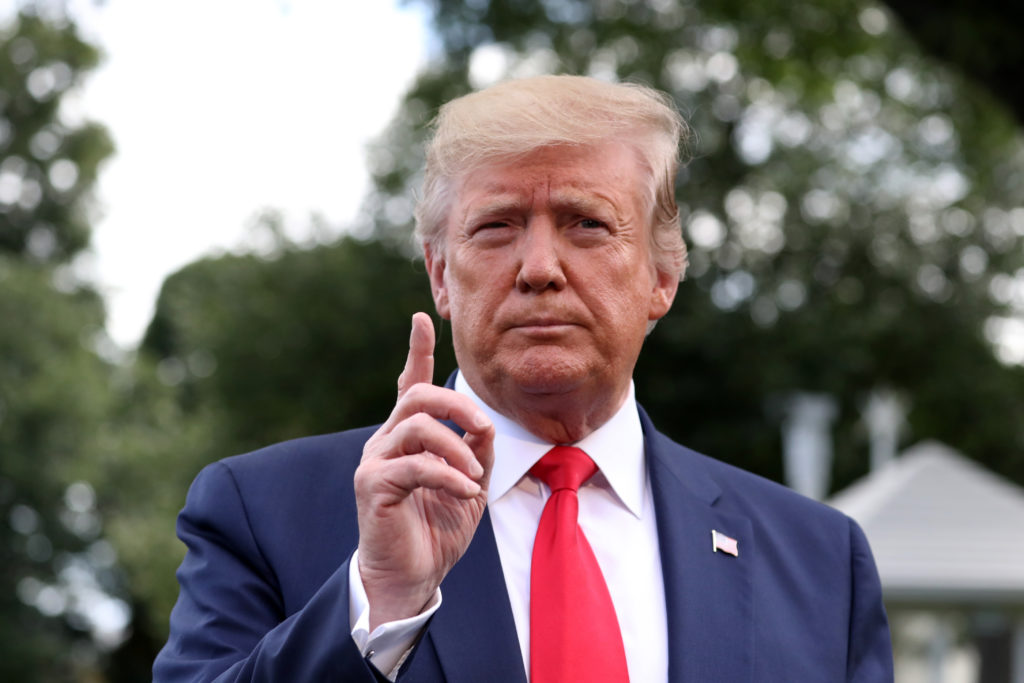
Four years after launching one of the most improbably successful runs for president in history, President Donald Trump officially kicks off its sequel on Tuesday, again offering himself as a political outsider — but this time from the Oval Office. Trump, who launched his last campaign from Trump Tower, headed for a mega-rally in Orlando, hoping to replicate the dynamics that allowed him to capture the Republican Party and then the presidency in 2016 as an insurgent intent on disrupting the status quo. It’s a more awkward pitch to make now that he’s in the White House. The president’s advisers said he aims to connect the dots between the promise of his disruptive first-time candidacy and his goals for another term in the White House. His promise to rock the ship of state is now more than an abstract pledge, though, complicated by his tumultuous 29 months at its helm. Any president is inherently an insider. Trump has worked in the White House for two years, travels the skies in Air Force One and changes the course of history with the stroke of a pen or the post of a tweet. “We’re taking on the failed political establishment and restoring government of, by and for the people,” Trump said in a video released by his campaign Monday. That populist clarion was a central theme of his maiden political adventure, as the businessman-turned-candidate successfully appealed to disaffected voters who felt left behind by economic dislocation and demographic shifts. And he has no intention of abandoning it, even if he is the face of the institutions he looks to disrupt. He underscored that on the eve of the rally in the must-win swing state of Florida, returning to the hard-line immigration themes of his first campaign by tweeting that, next week, Immigration and Customs Enforcement “will begin the process of removing the millions of illegal aliens who have illicitly found their way into the United States.” That promise, which came with no details and sparked Democratic condemnation, seemed to offer a peek into a campaign that will largely be fought along the same lines as his first bid, with very few new policy proposals for a second term. Early Democratic front-runner Joe Biden said Tuesday that Trump’s politics are “all about dividing us” in ways that are “dangerous — truly, truly dangerous.” But those involved in the president’s reelection effort believe that his brash version of populism, combined with his mantra to “Drain the Swamp,” still resonates, despite his administration’s cozy ties with lobbyists and corporations and the Trump family’s apparent efforts to profit off the presidency. Advisers believe that, in an age of extreme polarization, many Trump backers view their support for the president as part of their identity, one not easily shaken. They point to his seemingly unmovable support with his base supporters as evidence that, despite more than two years in office, he is still viewed the same way he was as a candidate: the bomb-throwing political rebel. On Monday, a boisterous crowd of thousands of Trump supporters, many of them in red hats, began gathering outside the Amway Center arena in Orlando, where the campaign had organized a festival with live music and food trucks. They spent Tuesday braving downpours and listening to a cover band playing Southern rock standards such as Lynyrd Skynyrd’s “Sweet Home Alabama” as they waited for Trump’s arrival. Vendors sold water, as well as pins, hats and T-shirts with slogans including “Trump 2020” and “ICE ICE Baby,” a reference to the law enforcement agency tasked with enforcing immigration laws. In the high-80s heat, some women wore “Make American Great Again” bathing suits. “Trump has been the best president we’ve ever had,” said Ron Freitas, a retired Merchant Marine and registered Democrat from the Orlando area who sat in a lawn chair. Freitas said he was sure Trump would prevail over whomever his Democratic opponent was. Alex Fuentes, a municipal diesel mechanic, wore a shirt that said “Make Democrats cry again.” He said he was an Iraq veteran who twice voted for Barack Obama but parted company with Democrats such as Hillary Clinton, mostly over foreign policy. “There’s a lot of minorities that are hidden Trump supporters,” Fuentes said. Hundreds of anti-Trump protesters clapped and took photos when a 20-foot (6-meter) blimp of a snarling Trump baby in a diaper was inflated. The blimp looks like the one that flew in London during Trump’s recent state visit but is not the same one. “The goal is to get under his skin,” said Mark Offerman, the blimp’s handler. Protester Shaun Noble wore a rainbow-colored sign that said “Super, Callous, Fragile, Racist, Sexist, Nazi, POTUS.” Noble’s mother was at the Trump rally while he was at the anti-Trump protest. “It’s really caused a divide in our relationship,” Noble said. “But it’s my right to believe what I want to believe in, and it’s her right to believe what she wants to believe.” Some members of the far-right hate group Proud Boys were spotted marching in Orlando and at least twice tried to enter the street where the anti-Trump protest was being held. They were stopped by groups of police officers and deputies. As they walked away, a man from the Proud Boys group said, “We’re just Americans. This is a sad day.” By Jill Colvin, Jonathan Lemire and Michael Schneider Associated Press. Lemire reported from New York. Associated Press writers Hannah Fingerhut, Josh Replogle and Zeke Miller contributed to this report. Follow Lemire on Twitter at http://twitter.com/@JonLemire and Miller at http://twitter.com/@zekejmiller Republished with the permission of the Associated Press.
Elizabeth Warren challenges Bernie Sanders for progressives’ 2020 support
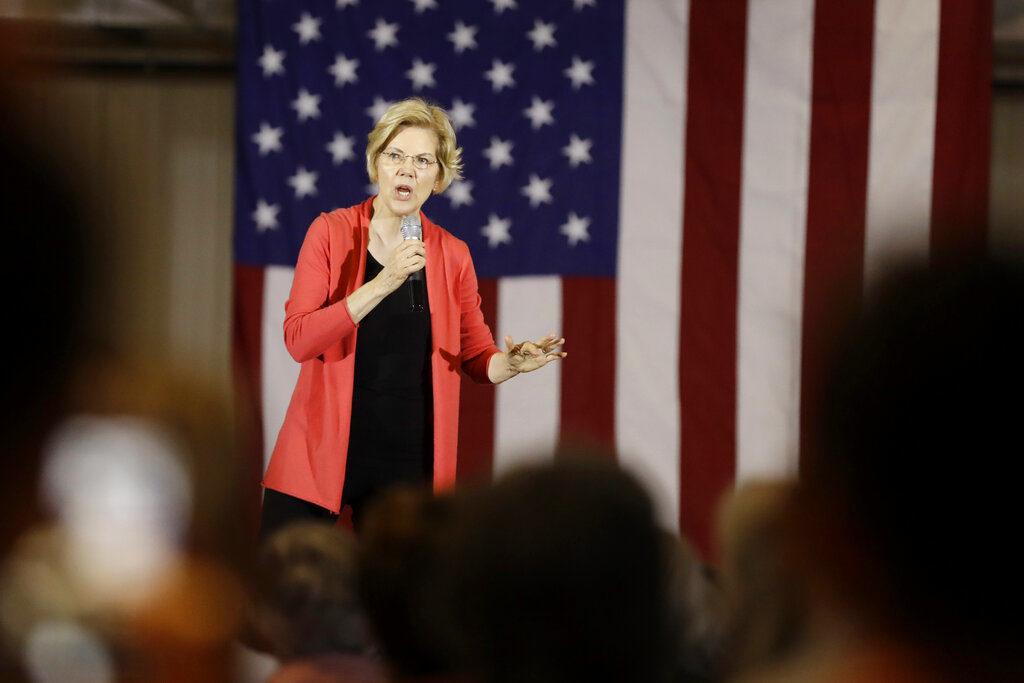
As a Michigan field organizer for Bernie Sanders‘ 2016 presidential campaign, Mike McDermott trained volunteers to knock on doors and call voters, helping the Vermont senator upset Hillary Clinton in a crucial Midwestern state. But as the 2020 campaign heats up , McDermott is all-in for Massachusetts Sen. Elizabeth Warren, creating a Michigan for Warren PAC to raise early money for her efforts and promoting her campaign through a website and Facebook page. While he’s still a Sanders fan, McDermott sees Warren as a fresher face who’s more electable and doesn’t have the baggage of a 2016 loss. “It’s really 1a and 1b for me,” McDermott said. “With Warren, I think there’s more crossover appeal. She doesn’t have 2016 branded on her.” That sentiment represents the new challenge facing Sanders, who is in second place in most national polls behind Joe Biden. The former vice president has eaten into Sanders’ base with appeals to blue-collar union voters. But Warren is emerging as another threat, winning over voters such as McDermott with a raft of proposals that sometimes go further left than those backed by Sanders. Warren and Sanders are vying to become the progressive alternative to Biden, a competition that’s especially pivotal in the Midwest. The region is critical to Democratic hopes of regaining the White House in 2020, and Sanders’ campaign wrote in an April memo that he’s “by far the best positioned candidate to win” in three upper Midwest states that handed President Donald Trump the White House. The central peril Warren poses for Sanders is her status as the fresher liberal face in the race, eager to demonstrate her energy with hours of post-town hall photo lines, according to more than a dozen interviews with Michigan voters last week. Sanders still draws bigger crowds than Warren, who recently promoted her economic agenda before nearly 2,000 people at Lansing Community College, but the pro-worker, anti-establishment brand he brought to 2016 is no longer his alone. “I don’t think, because Bernie Sanders did as well as he did in Michigan last time, that that means anything this time,” said Lisa Canada, political director with the Detroit-based Michigan Regional Council of Carpenters union. Alexandra Lee, a 35-year-old graduate student from Lansing, said she backed Sanders in 2016 but now plans to support Warren when Michigan holds its primary on March 10. That will be one week after Super Tuesday, when several states hold their nominating contests and the largest number of delegates are up for grabs. Lee said she thinks it’s time for a woman to be president: “I still like Bernie a lot. But I’d like to have someone younger and not male.” During her Michigan appearances, Warren laid out a populist pitch that subtly echoed some of the U.S.-workers-first messaging that helped Trump overtake Clinton in much of the Midwest. She attacked giant corporations that market themselves as American but make most their products overseas. “Those giant corporations, the more and more power they amass, understand this: They’re not loyal to America, and they’re not loyal to American workers,” the 69-year-old former law professor said in Lansing. “They are loyal to exactly one thing: their own bottom line, their own profits.” Warren’s economic plan calls for “aggressive intervention” to create U.S. jobs and benefit U.S. exports, a spirit that aligned broadly enough with the anti-globalization rhetoric Trump invoked in 2016 to earn kudos from Florida GOP Sen. Marco Rubio and conservative pundit Tucker Carlson. But Warren’s pro-union economic message also aligns with the case Sanders made in his Michigan victory over Clinton. The Vermonter continues to make worker protection in trade agreements a centerpiece of his campaign, alongside a $15-per-hour minimum wage and single-payer health care. Sanders told CNN on Sunday that his plan to lower student loan debt would “in some ways probably go further than” Warren’s, adding that “not only Senator Warren, but others have moved” toward his position, “considered to be pretty radical” in 2016. The key difference between Warren and Sanders as they jockey for position as the primary’s leading liberal — with Biden still far ahead in polls — may be their political liabilities. Warren has carefully set herself apart from Sanders’ self-identified democratic socialism, calling for stronger “rules” in the nation’s market economy to help make it more equal. Sanders’ supporters view him as the more proven commodity against Trump, pointing to polls that show him performing better against the president, but Warren is less well-known at this early stage of the 2020 primary, making it possible that she has more room to climb. In the critical early voting state of Iowa, a new CNN-Des Moines Register primary poll released Saturday found Sanders tightly clustered with Warren and South Bend, Indiana, Mayor Pete Buttigieg, rather than holding the clear second-place status he’s had in most national surveys. For Michigan Democrats like Abdul El-Sayed, whose unsuccessful gubernatorial campaign last year won Sanders’ endorsement, the presence of two strong progressives in the presidential race will ultimately mean “a far better candidate” than 2016. El-Sayed has not endorsed in the 2020 primary yet but noted that Sanders has “a profound amount of support in our state” thanks to his first presidential bid. Even so, some of that support may not remain firm. Cruz Villareal, a college writing tutor, supported Sanders in 2016 but said he’s looking for “radical change” — the same thing he was looking for in 2016 — and this time it’s Warren who can deliver as the less polarizing candidate. “I think that Bernie can’t win in the general, and I think they will fight him from the left and the right,” Villareal said. “They will do to Bernie what they did to him last time. I think they’re less likely to do it to Elizabeth.” Schor reported from Washington. Associated Press writer Emily Swanson contributed to this report. Republished with the permission of the Associated Press.
Donald Trump urges Roy Moore not to run for US Senate in Alabama
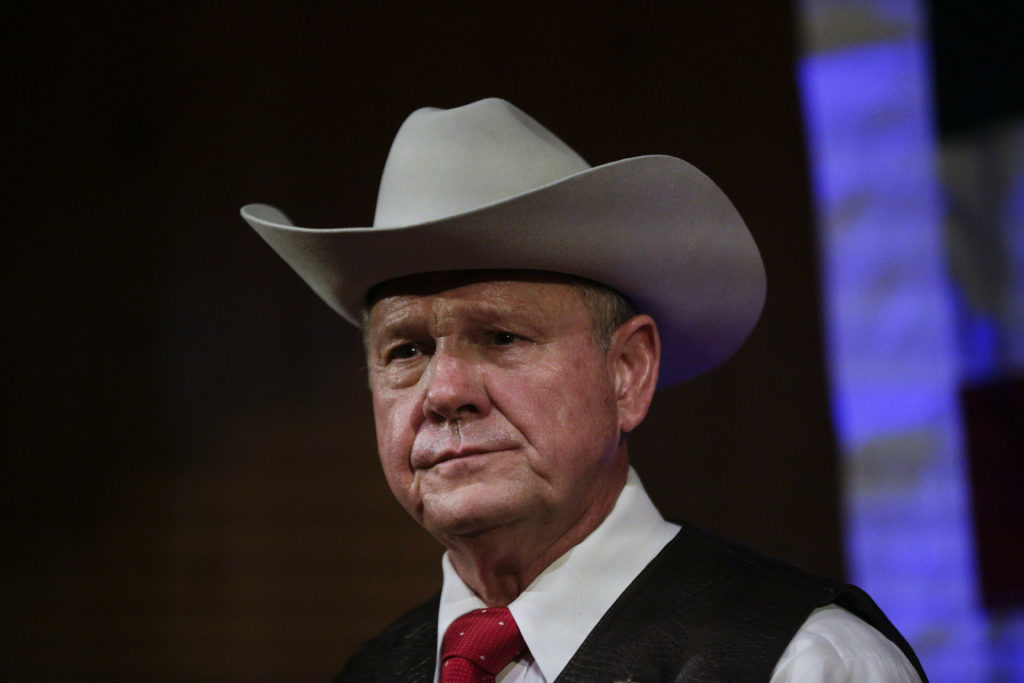
President Donald Trump on Wednesday discouraged Alabama Republican Roy Moore from running for U.S. Senate again in 2020, saying the GOP must regain the once reliably red state and Moore “cannot win.” Moore, who contends establishment Republicans are trying to keep him from running, disputed the assertion saying, “everybody knows I can win.” Moore lost the 2017 special election to Democrat Doug Jones amid sexual misconduct allegations. He is considering a second run in 2020. “Republicans cannot allow themselves to again lose the Senate seat in the Great State of Alabama,” Trump wrote in a Wednesday morning tweet. Trump, who backed Moore in 2017 despite the allegations, tweeted “I have NOTHING against Roy Moore,” but warned “Roy Moore cannot win.” Trump added that if Democrats retain the seat in 2020, “many of the incredible gains that we have made during my Presidency may be lost.” Moore told The Associated Press in a telephone interview that he has not made a decision about whether to enter the 2020 race, but Trump’s comments will not influence him. “I think the president is coming under pressure from people in Washington, scared that I will run for the Senate, scared I will win and know I can win,” Moore, 72, said. “Everybody knows I can win and that’s what’s worrying in Washington.”Moore said he will announce a decision in June. Jones defeated Moore in 2017 by 22,000 votes out of 1.3 million cast in a special election to fill the seat previously held by Jeff Sessions, who became Trump’s attorney general. Republicans control the Senate 53-47 and view defeating Jones as a top priority. Jones, 65, is considered the most endangered Democratic incumbent facing re-election in 2020, a year when several GOP senators are vulnerable and control of the chamber will be at stake. As he weighs a possible rematch with Jones, Moore contends the 2017 election was a “fraud” adding he has tried to “repudiate the false accusations that came against me.” Six women accused Moore of pursuing romantic or sexual relationships with them when they were teenagers as young as 14 and he was an assistant district attorney in his 30s. Two accused him of assault or molestation, accusations that he has vehemently denied. See previous stories from Alabama Today. A crowded GOP primary field is taking shape for the 2020 race in Alabama. Congressman Bradley Byrne, former Auburn University football coach Tommy Tuberville and legislator Arnold Mooney have announced Republican primary bids. Moore retains a strong following among some evangelical voters in the state. He was twice elected as the state’s chief justice but was twice stripped of those duties. A judicial ethics panel said he defied, or urged defiance of, federal court orders regarding same-sex marriage and the public display of the Ten Commandments. Republished with permission of the Associated Press.
Cory Booker proposes national license for all gun owners
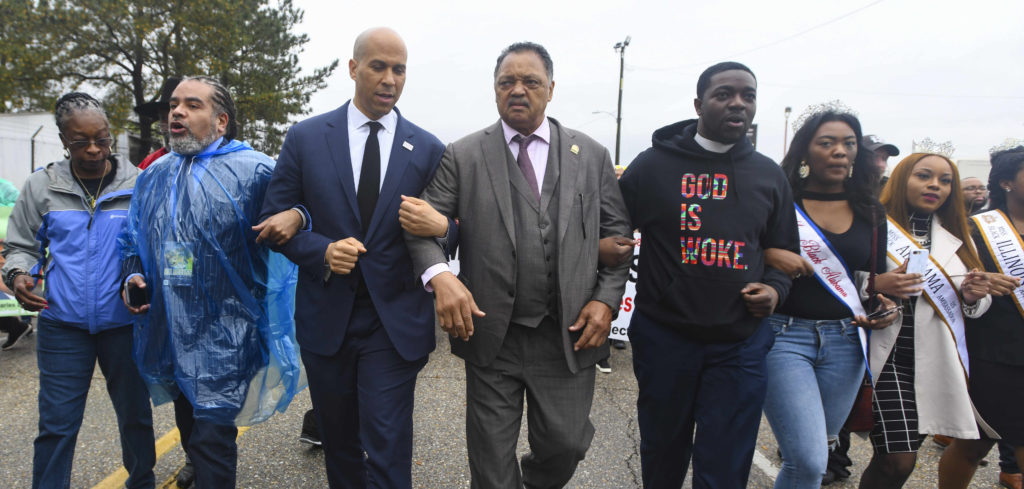
Democratic presidential candidate Cory Booker is proposing that all gun owners be licensed by the federal government, a process that would include an interview and safety training. National licensing is one of more than a dozen specific proposals in a sweeping gun control agenda the U.S. senator from New Jersey released on Monday. It’s his second policy rollout in three weeks as he tries to break through the crowded Democratic primary field . While current gun owners and first-time buyers would be subject to the federal license requirement, a transition period would allow current owners to come into compliance, the Booker campaign said. No such national gun license program currently exists. Thirteen states and the District of Columbia have enacted some form of licensing or permit rules before people can buy guns, according to the Giffords Law Center to Prevent Gun Violence. “I am sick and tired of hearing thoughts and prayers for the communities that have been shattered by gun violence — it is time for bold action,” Booker said in a statement. Last month during a high-profile speech in his hometown of Newark, Booker vowed to “bring a fight” to the National Rifle Association, which generally opposes gun restrictions. Booker, a former mayor of Newark, New Jersey’s largest city, said gun violence is an issue close to him, with several people being shot in his neighborhood recently. “We must step up and deal with something that is crushing communities, destroying lives and really just tearing apart families,” Booker said in an interview on CBS’ “CBS This Morning.” Booker’s gun control agenda includes universal background checks for gun buyers; the reinstitution of a ban on assault weapons and high-capacity firearm magazines; and the modernization of the Federal Bureau of Alcohol, Tobacco, Firearms and Explosives. The plan would face a steep climb to winning approval from a Democratic House and would face even stiffer resistance in a Republican-controlled Senate, where less-sweeping gun control measures have failed in recent years. President Donald Trump has said the constitutional right to bear arms is “under assault.” Trump, a Republican, spoke at the NRA’s annual convention last month, vowing to fight for gun rights and imploring NRA members to rally behind his reelection bid. Booker, who launched his presidential campaign in February, has struggled to rise from the low single digits in polls of the 21-candidate Democratic primary field, though he recently secured the 65,000 donors necessary to meet both qualifications for participation in next month’s first debate . He released an environmental justice plan late last month. Republished with the permission of the Associated Press.


